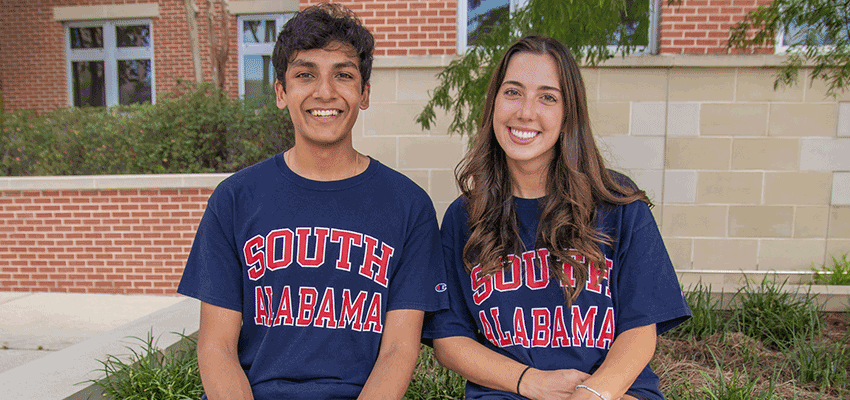Biomedical Sciences Honors Students Present Research to USA Foundation
Posted on September 22, 2022 by CAHP

Junior biomedical sciences students Neil Chaudhary and Andrea Vavrinek attended a meeting and lunch hosted by the USA Foundation on Thursday, August 25. The USA Foundation is a philanthropic organization dedicated to supporting the University of South Alabama’s academic programs, faculty and students.
During the meeting, both Neil and Andrea had the opportunity to speak to Foundation members about their recent Summer Undergraduate Research Fellowship experiences. The SURF program promotes critical thinking while providing students with hands-on experience in a research laboratory. The SURF program is run by the USA Office Of Undergraduate Research.
Neil was involved in identifying two distinct small nucleolar-derived RNAs snoRNAs namely sdRNA-A24 and sdRNA-D19b that are overexpressed in prostate cancer compared to normal prostate tissue. Their potential roles in the maintenance and onset of prostate cancer were evaluated. It was determined that both sdRNA-A24 and sdRNA-D19b levels significantly increase PC3 cell proliferation in tissue cultures. PC3 is a human prostate cancer cell line.
Moreover, that sdRNA-D19b overexpression markedly increased the migration of PC3 cells, an indicator of metastasis. The goal is to determine if the sdRNA-A24 and sdRNA-D19b biomarkers can lead to novel diagnostic and therapeutic treatments in the clinical setting. Dr. Glen Borchert of the College of Medicine’s pharmacology department was Neil’s SURF mentor.
Andrea was involved in a study looking at the effects of different exotoxins made by the bacterium Pseudomonas aeruginosa on endothelial cells that line lung blood vessels. P. aeruginosa is the number one cause of ventilator-associated pneumonia (VAP) in ICU patients. It possesses a unique type three secretion system or T3SS that literally injects its exotoxins into pulmonary endothelial cells causing damage. Fluid then leaks into the lungs causing pneumonia. Exotoxin Y (ExoY) doesn't kill endothelial cells.
The goal was to find out if ExoY exhibited a protective effect on endothelial cells infected with other T3SS exotoxins such as Exo S or Exo T. So far, it does not appear that Exo Y has a protective effect. A better understanding of exotoxin relationships can lead to a more effective treatment. Drs. Phoibe Renema and Terry Ravine from the Department of Biomedical Sciences served as Andrea’s SURF co-mentors.
Dr. Douglas Marshall, interim dean of the Honors College, was also present at this event and personally invited both students to represent
the Honors College. Both Neil and Andrea are continuing with their respective studies
as an Honors College thesis project. Every graduate of the Honors College is required
to complete an honors thesis.
